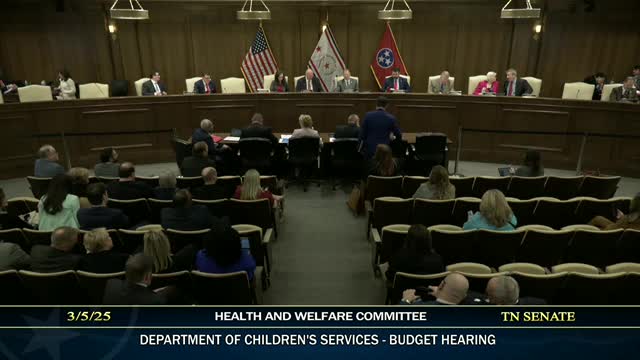Department of Children's Services outlines budget for expanded treatment, case managers and intake centers
Get AI-powered insights, summaries, and transcripts
Subscribe
Summary
Commissioner Margie Quinn told the Senate Health and Welfare Committee that DCS is shifting from crisis response to strategic care, seeking funds to recalibrate residential custodial budgets, expand assessment treatment homes and specialized foster care, and to extend supports for youth aging out of care.
Department of Children Services Commissioner Margie Quinn told the Senate Health and Welfare Committee that DCS has shifted from crisis response to a strategy-driven model and asked lawmakers to fund changes to match the agency's current caseload and clinical needs.
The request presented to the committee covered several categories: recalculation of the residential custodial budget to reflect a higher-acuity population; expansion of assessment treatment home beds from 48 to 96; maintenance of recent provider rate increases; continued funding for specialized treatment foster care; private-provider case management to add 95 case managers in stressed regions; targeted Intercept (Youth Villages) expansion in 15 counties that produce half of the state's foster entries; and supports for youth aging out of care, including a continuation of LifeSet and extension of foster care case management.
Quinn said recent workforce and placement metrics show progress: the DCS all-case-manager turnover rate for the first seven months of the fiscal year fell to 11.9% from 16.9% the prior 12 months and from as high as 28.8% in 2022. She told the committee that open case manager positions have dropped from 692 when she took office to 258 at the time of the hearing and that a new class of roughly 75 case managers will begin April 28.
Executive director of network development Frank Mix summarized placement trends that are driving the budget request: an increasing share of children is placed in higher-cost residential treatment (level 3 enhanced, PRTF, and level 4), while placements in lower-cost levels have declined. "The purpose of this request is to address the imbalance this change in our service population has created and ensure that DCS's residential placement budget is funded to support the children we serve today," Mix told the committee.
Quinn and staff asked for continued funding of policies enacted over the past two years (including provider rate investments) so the state can maintain new vendor capacity and reduce reliance on short-term or office-based placements. They described assessment treatment homes as short-stay clinical assessment settings (average length of stay cited as about 38 days) that improve downstream placement stability, and recommended doubling those beds to reduce disruptions.
The budget packet also includes requests aimed at youth aging out of foster care: extension of foster care from age 21 to 23 (an administration bill moving separately through the legislature), funding for LifeSet services and workforce pathways (including connections to TCATs and employer partners), and a request to fund salary increases for forensic interviewers at child advocacy centers.
Committee members asked for details on caseloads, hiring cadence and program costs. Quinn said regional caseloads vary; one region that had averaged as many as 96 cases per manager has been reduced to about 32'34. She said DCS is using an 18-week pre-service training model and running roughly five to six cohorts of new hires a year; the department considers ~2,200 case managers near full staffing and expects to reallocate positions across regions as hires stabilize.
On facilities, Quinn said the agency is proceeding with a real-estate plan to build new intake/assessment centers and to replace older residential facilities such as Wilder with more clinically oriented, efficient sites; she said those longer-term capital decisions could change unit costs but declined to forecast precise savings. She also said some juveniles are still placed out of state when the specific specialty care they need is unavailable in Tennessee.
The committee voted to move the DCS budget package to the Senate Finance committee.
